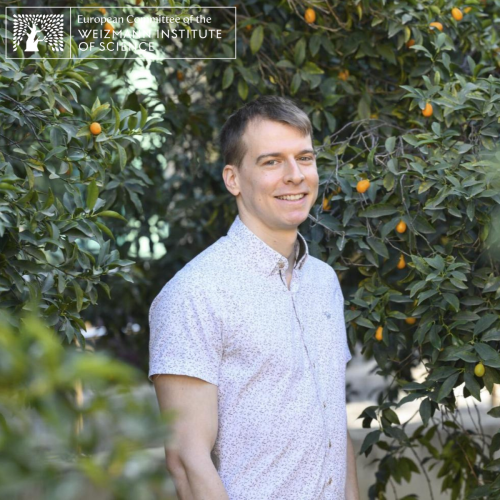Weizmann Student Spotlight: Michael Sokoletsky

Photographed by the Weizmann Photography Unit
Meet Michael Sokoletsky, PhD Candidate in the lab of Prof. Ilan Lampl, Department of Brain Sciences, Weizmann Institute of Science.
Michael received a scholarship for his studies from a donor from the European Committee of the Weizmann Institute of Science and also presented at an event of the Swiss Society of the Weizmann Institute of Science. Michael’s charisma, enthusiasm and passion for science and life at Weizmann is contagious!
We asked Michael several questions. See his answers below.
What motivated you to pursue a PhD in neuroscience?
I wanted to understand the basis behind what it means to be human: to experience the world, to think, and to act. I think this is one of the largest unexplored frontiers in science, where, despite having learned a great deal in the last few decades, we still have far more questions than answers. Of course, in a single PhD you cannot solve them all. However, in neuroscience, I felt that every bit of progress can be tremendously helpful in understanding both how the brain normally works and what happens when it goes awry, as in mental disorders.
What about Weizmann made you want to devote your time and research here?
I came to Weizmann because it is an outstanding place for pursuing curiosity-based research with essentially no limits. Even for someone like me coming from a completely different field (physics and philosophy), I was offered full tuition to undertake coursework and short projects in several world-class labs. This allowed me to explore multiple subfields and find where my passion lay before ultimately joining the lab where I conducted my PhD research.
What have you been most surprised about since starting at Weizmann?
I was most surprised about the ratio of research staff to students, which is nearly one-to-one. This means that at Weizmann, you can get help with virtually anything you need—from putting together electric circuits, to building experimental set-ups, to constructing viral vectors and sequencing their DNA. This is extremely valuable in that it allows researchers to push their boundaries without worrying about getting stuck on one step or another that is outside their expertise.
How has your outlook on your research evolved over time?
At the beginning of my PhD, I thought I was going to answer a certain basic question about sensory perception. However, after conducting many experiments and looking deeply at the data, I realized that in fact my initial hypothesis was likely incorrect all along. This led me to formulate a new hypothesis that was much more consistent with the data but also surprising and counterintuitive. I found this experience to be humbling – the brain, and nature in general, does not necessarily work according to our hunches, and it certainly does not care about what we want to see. At the same time, it made me mature as a scientist. I now approach research with a greater sense of openness—embracing the unexpected rather than clinging to a favored hypothesis—and with a deeper respect for how complex and surprising the brain can be.
Anything else you would like to share?
Scientific research is not done in a vacuum. We are people, not robots, and our research benefits tremendously when we flourish in other areas of life. This is why I became invested in improving the student experience in Weizmann by participating in the Weizmann Student Council. During my time there, we successfully advocated for greater financial assistance to students (such as by subsidizing on-campus dining) and support for extracurricular activities like sports and music. The administration here has been very receptive to our proposals. Although I finished my term in the council, I still find time here and there for advocacy. In particular, I recently ran a petition to build an accessible outdoor gym, which would bring both physical and mental health benefits to people on campus.